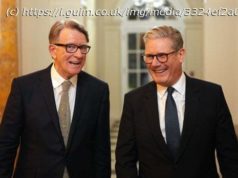The business doesn’t like tariffs today because it is paying them. It had a different opinion 35 years ago when the Reagan administration imposed tariffs on foreign motorcycles, which were paid by…
You have to love President Donald Trump. As a businessman he was ruthless in squeezing every last dollar from every opportunity. To lower costs he produced his goods in at least twelve foreign countries, including China, Indonesia and Mexico. Anything to make a buck.
So it must be karma. The president launched a trade war, which basically means shooting one’s own consumers and producers.
Among those hurt is the iconic U. S. motorcycle producer Harley-Davidson. The Trump tariffs are hurting the firm’s bottom line. The latest estimate is that aluminum and steel levies will raise Harley-Davidson’s costs by about $20 million this year, while European Union retaliation will cost the company another $45 million. The cost for next year will run $90 to $100 million.
But that isn’t all. The president barred American participation in the Trans-Pacific Partnership, which lowered tariffs of other nations more than the U. S.
This kept foreign tariffs higher, including on U. S.-made motorcycles. So Harley decided to do what businessman Trump would have done: move productive facilities to Thailand to make more money.
Now Harley plans to move more manufacturing overseas in order to sell motorcycles in Europe. Said Harley-Davidson, shifting production to Europe “is not the company’s preference, but represents the only sustainable option to make its motorcycles accessible to customers in the EU and maintain a viable business in Europe.”
The president is livid. This most American of bikes should “never be built in another country — never!” He accused Harley of being “the first to wave a White Flag” in his trade war. The president complained that the company was just using the higher costs as an excuse for doing what it wanted to do anyway.
He apparently feels personally betrayed. In February 2017 he hosted company executives and labor leaders at the White House. At the time he declared: “Thank you, Harley-Davidson, for building things in America.” He said he expected them to expand and he planned “to help you, too, and we’re going to make it really great for business.”
So he suggested possible retaliation: “Harley must know that they won’t be able to sell back into the U. S. without paying a big tax!” Indeed, he added that if they leave “The Aura will be gone and they will be taxed like never before.” A White House aide said his message was that “If you make decisions to go elsewhere, it’s going to be a problem for their business.”
The Washington Post complained about the president’s “authoritarian reaction.” Sen. Ben Sasse, R-Nebraska, declared: “The problem isn’t that Harley is unpatriotic — it’s that taxes are stupid.” Blogger Rob Port complained: “Expecting companies to deal with a higher cost of doing business out of some sense of patriotism is absurd.”
That’s all true. Indeed, Harley isn’t likely to be alone in moving. Punishing American firms is a dubious way to promote “Made in America.”
But Harley-Davidson is a special case. The business doesn’t like tariffs today because it is paying them. It had a different opinion 35 years ago when the Reagan administration imposed tariffs on foreign motorcycles, which were paid by American consumers.
In April 1983 Harley neared bankruptcy. Company executives had staged a buy-out, so the firm lacked deep pockets and carried significant debt. With high labor costs and poor management, Harley was vulnerable to efficient Japanese manufacturers. So the Reagan administration raised the bike tariff from 4.4 percent to 49.4 percent.
Related Articles
Chapman must uphold the traditions of scholarship driven by facts, not by billionaires
In Janus v. AFSCME, the Supreme Court sided with corporate extremists over workers
Mammoth Lakes has a bad corporate neighbor
Homeowners stuck with public nuisance designations
Orange County needs an independent auditor-controller Unsurprisingly, the company was happy to have the government hobble its prime competitors. Ironically, it’s not clear that the tariffs, which were lifted four years later, contributed much to the firm’s turnaround. More important were internal improvements. By one estimate the increased tariff was responsible for just 6 percent of higher sales.
But in 2008 and 2009 Harley also took out 33 emergency loans through the Federal Reserve’s Commercial Paper Funding Facility worth $2.3 billion. The company was wobbly and relied on cheap federal credit.
Thus, the issue isn’t just Harley responding to a worsening economic environment created by the president. The company ran to Uncle Sam for aid, but now doesn’t want to help others. Aid for me but not for thee appears to be Harley’s perspective. So I’m okay with the president shaking down Harley-Davidson.
President Trump’s trade war will do far more harm than good. However, it has exposed the hypocrisy of American business. If firms want the benefit of trade restrictions, they should be prepared to bear the costs as well.
Doug Bandow is a senior fellow at the Cato Institute. A former special assistant to President Ronald Reagan, he is author of Foreign Follies: America’s New Global Empire.






